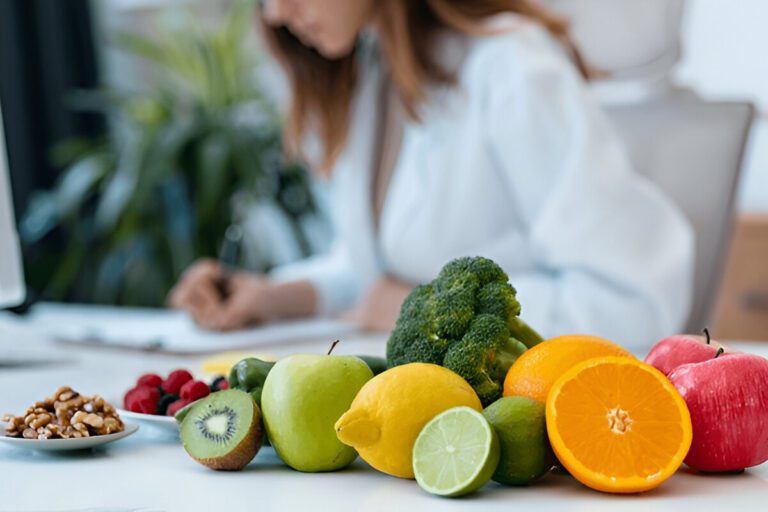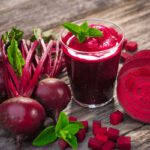What is the GM Diet?
Originally crafted by General Motors, the GM diet is a 7-day plan designed with the intention of keeping employees at General Motors Corporation both healthy and energized. This strict meal plan is recognized for its quick impact on weight loss, claiming to help individuals reduce up to 3.18 kg in just 7 days.
The diet menu focuses on low-calorie, nutrient-rich foods that eliminate processed foods, fats, and excess glucose, supporting the body’s natural ability to detox, accelerate metabolism, and improve digestion. It promotes fat burning through a day-by-day sequence of structured eating, carefully tested at the Johns Hopkins Research Center, and backed by approval from bodies like the FDA and USDA.
Enthusiasts believe in its benefit to overall health, energy, and even skin glow, though concerns exist about its deficiency in key nutrients and essential protein sources like lean protein and whey protein.
Initially shaped by registered dietitian Jay Robb, the program stipulates full commitment and includes customized breaks at regular intervals to prevent negative side effects such as bloating, irregular bowel movements, and inflammation.
Whether your goal is a complete cleanse, enhancement of metabolic function, or managing health conditions like steatosis, this chart-guided plan can offer measurable success—when followed under expert assessment and grounded in firm belief.
Still, it’s essential to balance the number of expected outcomes with scientific awareness and a proven long-term strategy for safe consumption across every type of user

7-Day Fruit Diet Plan
| Day | Goal | Foods to Eat | Sample Meals |
|---|---|---|---|
| Day 1 | Hydrate, Detox, and Energize with Fruit Power | Apple, papaya, watermelon, musk melon, kiwi, orange, grapes, guava, litchi, blueberries, pomegranate | Breakfast: Apple/pomegranate + water; Snack: Berries; Lunch: Sweet lime/pineapple; Evening: Coconut water/strawberries; Dinner: Guava |
| Day 2 | Colorful Combo of Fruits and Veggies | Apple, pineapple, watermelon, cucumber, carrots, broccoli, tomato, beetroot, cherry tomatoes | Breakfast: Melon + carrots; Lunch: Salad (cucumber, tomato, beetroot); Snack: Juice/ripe fruit; Dinner: Cabbage soup + broccoli |
| Day 3 | Colorful Combo of Fruits and Veggies | Apple, pineapple, watermelon, cucumber, carrots, broccoli, tomato, beetroot, cherry tomatoes | Breakfast: Melon + carrots; Lunch: Salad (cucumber, tomato, beetroot); Snack: Juice/ripe fruit; Dinner: Cabbage soup + broccoli |
| Day 4 | Power Up with Bananas and Milk | 8–10 bananas, 750 ml low-fat/skimmed/soy milk, optional figs | Breakfast: Banana smoothie; Lunch: Sliced banana + milk; Dinner: Banana + milk (with figs optional) |
| Day 5 | Protein Power with Meat and Tomatoes | Meat, chicken, fish, paneer, tofu, eggs, brown rice, tomatoes | Breakfast: Boiled eggs/paneer; Lunch: Chicken/tofu + tomatoes; Dinner: Beef/fish/paneer + light seasoning |
| Day 6 | Meat Meets Veggies for Balance | Meat, paneer, tofu, brown rice, cabbage soup, mixed veggies, brussels sprouts, cucumber | Meals: Lean meat or veg options + rice + greens, cooked with minimal oil and seasoning |
| Day 7 | Finish Strong with Brown Rice and Juices | Brown rice, fruit juice, vegetable juice, spinach, kale, arugula, avocado, pomegranate, berries | Breakfast: Fruit juice + rice; Lunch: Brown rice + veggies + seeds; Dinner: Avocado, berries, pomegranate + detox juices |
What to Eat & what to Avoid?
What to Eat
For optimal results on your 7-day diet plan, focus on whole, nourishing foods. Start your day early between 8:00 am and 4:00 pm, enjoy structured meals and light snacks every 2 hour, supporting your metabolism. Choose fresh and organic fruits like papaya, apple, melon, banana, strawberries, chayote, and even exotic picks like bacuri. Pair them with fresh and organic vegetables such as kale, spinach, broccoli, cucumber, and tomatoes, preferably raw to preserve their nutrients. Add lean proteins like chicken, fish, eggs, tofu, and turkey to build muscle while burning fat. Incorporate healthy fats such as avocado, olive oil, or flaxseed oil, and consider whey protein for post-workout recovery. Stay hydrated with at least 12 glasses of water per day, and complement your eating habits with low intensity exercise like walking or gentle stretching to promote fat loss and circulation. Just eat clean and consistent your body will thank you.
What to Avoid
To stay on track, it’s crucial to know what not to put on your plate. Avoid high-carb staples like rice, pasta, bread, wheat flour, and processed snacks such as cakes, cookies, and chocolates. Say no to sugar, sweeteners, sugar dressing, and any processed food including ready-made juices, canned food, powdered seasonings, and frozen ready-to-eat meals. Cut out processed meats like sausage, salami, ham, bacon, mortadella, and turkey breast. Keep away from salt, high salt foods, soy sauce, Worcestershire sauce, dressing, and any vegetable broth. Be cautious with starch-containing vegetables such as potatoes, corn, and peas—they’re only allowed at breakfast in limited amounts of 100–150 calories. Don’t put cornstarch in soup, and mostly prefer skimmed milk while avoiding any cream, milk with sweeteners, or fruit juice enhanced with sugar. Skip coffee, green tea, black tea, and all alcoholic drinks. Remember: never starve yourself. If you’re hungry, eat more fruit, but always avoid eating anything off this list to maintain your rhythm.
Risks and Contraindications
While the fruit diet may sound refreshing and light, its low calorie nature can quickly lead to hunger, tiredness, dizziness, and even weakness or fainting, especially when extended beyond 3 days. Because it’s highly restrictive in nutrients and calories, this plan poses real danger of nutritional deficiencies and fluctuating blood sugar levels. It is strongly discouraged for those who are pregnant, breastfeeding, or belong to sensitive groups such as older adults, children, and adolescents. Anyone with conditions like anemia, osteoporosis, or issues with the heart, kidneys, liver, or gallbladder should also avoid it. Additionally, individuals with a history of binge-eating, anorexia, diabetes, pre-diabetes, insulin resistance, or polycystic ovary syndrome may find this diet not only unhelpful but potentially harmful.
Smart Additions to Maximize Your Results
- Prevent protein deficiency during your 7-day fruit diet by adding a plant-based protein powder made from pea protein or hemp protein. This helps maintain muscle mass, supports muscle gain, and combats fatigue while you’re losing fat and aiming for weight loss.
- To improve skin health, include natural sources of collagen like citrus fruits, berries, and tomatoes. These, along with vitamin C and antioxidants, help maintain elasticity and stimulate collagen production as you lose weight.
- Support your hair and nails during a diet shift by taking a biotin supplement. It helps boost keratin production, prevents weakness, and improves nail strength and overall healthy appearance.
- To boost collagen naturally, include foods rich in omega-3 fatty acids such as flaxseeds, walnuts, and algae-derived supplements. Add vitamin C-rich fruits like kiwi, oranges, and strawberries to your meals, and maintain proper hydration for firm skin, elasticity, and a youthful look.
- While fruits are essential, remember portion control. Avoid excessive eating and excess sugar by sticking to reasonable amounts throughout the day, control your servings, and drink plenty of water to stay hydrated and balanced.
Conclusion
The 7-day diet plan inspired by the GM diet offers a quick weight loss solution that blends a natural approach with the potential to detox, boost metabolism, and enhance skin health. While the Fruit Diet is positioned as the best weight loss diet by many, it’s important to note that this short term program may have demerits—especially if individuals experience slight reactions like muscle weakness, fatigue, headaches, or dehydration due to a sudden shift in eating patterns. The solemnity of such reactions varies based on a person’s routine and immunity. Moreover, a drop out can lead to overeating and negatively impact body physique, making self-commitment, discipline, and sincerity key for long-term success. By following a well-rounded method—ensuring proper nutrients, staying hydrated, and including biotin supplements, collagen-boosting foods, and plant based supplements—you can truly reset body, achieve your goals, and experience renewed energy, smoother digestion, and overall well-being. This plan isn’t just a weight reduction tool—it’s a gateway to a healthier, more vibrant life.
How much weight will I lose if I only eat fruits for 7 days?
If you eat only fruits for 7 days, you may lose around 2 to 4 pounds, depending on your starting weight and activity level. Most of the initial loss is water weight. Results vary by metabolism and calorie intake.
How can I lose 5 kg in 7 days?
To lose 5 kg in 7 days, focus on portion control, frequent small meals, and drinking plenty of water. Choose low-calorie, whole foods and avoid late-night eating. Daily physical activity like walking or light cardio can support faster results.
Can you lose 4-5 kg from eating fruits for a week?
Yes, it’s possible to lose 4–5 kg in a week by eating only fruits, especially due to reduced calorie intake and water loss. The results depend on your metabolism and portion sizes. Consistency and hydration play a key role.
What fruit is best for weight loss?
Fruits like apples, pears, and kiwis are great for weight loss due to their high fibre content and low calorie count. They help keep you full longer and curb cravings. Choosing seasonal fruits can also support better digestion and metabolism.







